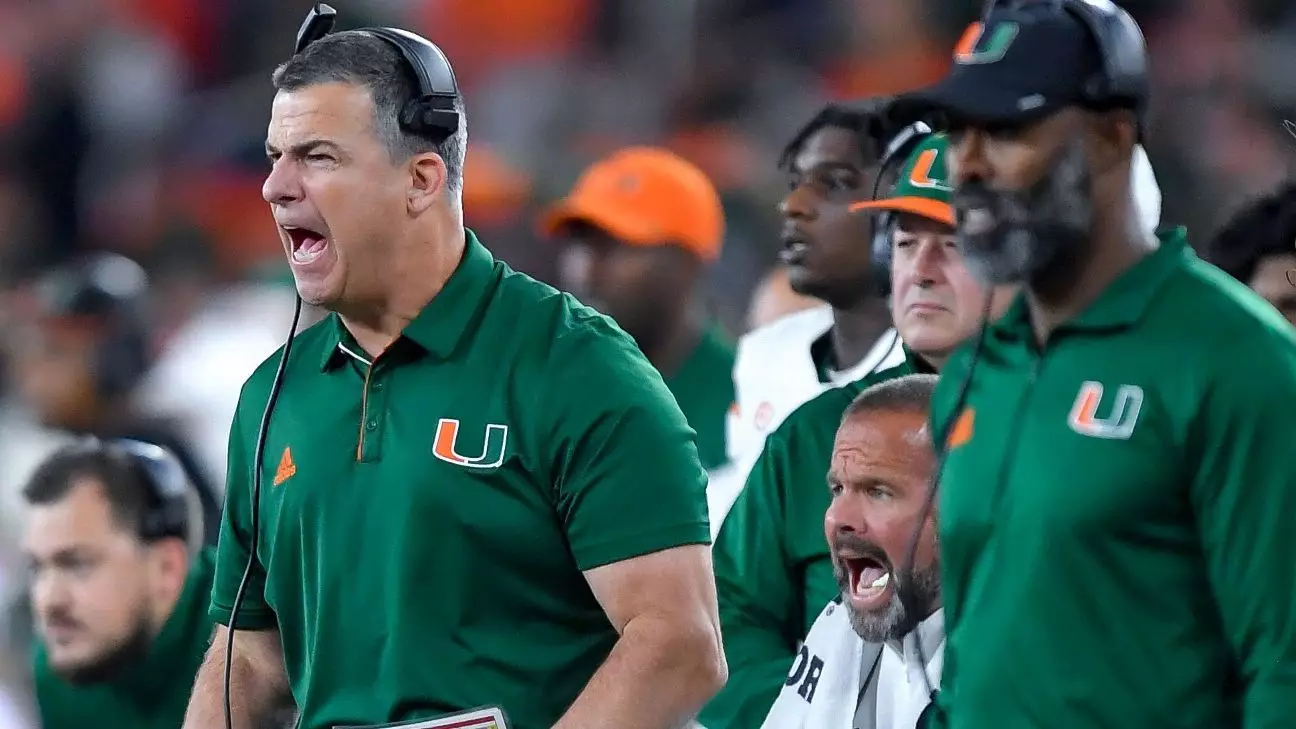The College Football Playoff (CFP) rankings serve as critical benchmarks for teams vying for a chance at the national championship. Recently, the release of the final CFP rankings before the playoff culminated in a significant controversy, particularly for the Miami Hurricanes. As the rankings unfolded, Miami found itself controversially placed at No. 12, much to the dismay of its supporters and the Atlantic Coast Conference (ACC) at large. This article delves into the implications of the rankings, examines the arguments presented by Miami’s coach, and considers the broader context of their season.
The situation escalated quickly when Alabama claimed the No. 11 spot, edging out Miami after the Hurricanes had suffered a second defeat of the season against Syracuse. This scenario signals a potentially tumultuous shift for Miami, as while they maneuvered through a challenging schedule, their loss left them on the brink of elimination from playoff contention. The Hurricane’s performance, marred by late-season struggles, ultimately curbed their path to the inaugural 12-team playoff, denying them the opportunity to compete for a championship title—a stark contrast to Alabama’s fortuitous climb back into relevance after a rocky season under coach Kalen DeBoer.
ACC commissioner Jim Phillips expressed profound disappointment regarding Miami’s plummet in rankings. His statement underscored a broader sentiment within the league—the belief that Miami, despite its setbacks, demonstrated skill worthy of playoff inclusion. Phillips remarked that it was a shock the committee placed Miami so low, asserting that the team “absolutely deserves better.” Such comments highlight the intricate dynamic in college football rankings, where perception often muddles the reality of a team’s performance.
Following the disappointing rankings, head coach Mario Cristobal took to the airwaves to advocate for his team. On a South Florida radio station, he urged the selection committee to evaluate their performance objectively. Cristobal pointed out the Hurricanes’ strong ten-win season and the fact that their losses were narrow defeats, emphasizing that each loss was a result of a single possession. This argument positions Miami as a team that, despite its missteps, displayed resilience and competitive spirit.
In his discussion, Cristobal highlighted Miami’s significant achievements—an undefeated home record, standout performances from Heisman Trophy contender Cam Ward, and a prolific offense leading the nation in yards and points per game. These facts are pivotal when making a case for postseason contention, as they illustrate Miami’s capacity to compete against tough opposition, though some might argue that the lack of encounters against ranked teams weakens their case.
While Miami enjoyed a solid start to the season, the subsequent problems became evident. The team’s defense, characterized by allowing over 31 points in five of their last eight games, raised serious questions about its capability to compete at a higher level. Critics pointed out these defensive lapses as significant shortcomings in an otherwise commendable season. This inconsistency likely played a vital role in their exclusion from the CFP and indicates areas that require attention moving forward.
Despite these challenges, Miami’s rankings stayed competitive—they were still ranked among the top 25 teams nationally in both offensive and defensive statistics. Indeed, the Hurricanes’ place within these metrics suggests a complex narrative; on one hand, they achieved notable successes, yet on the other, their failures were pronounced and consequential.
The debate over the Miami Hurricanes’ exclusion from the College Football Playoff rankings underscores the complexities of evaluating a team’s season. With a mixture of impressive statistics and counterproductive losses, Miami becomes a case study in how performance divergences can dictate postseason opportunities. As the Hurricanes reflect on this season, they must address the inconsistencies that emerged late in the campaign while leveraging their strengths to prepare for future challenges.
As college football continues to evolve and expand into a more inclusive playoff format, the lessons learned from this year’s rankings will resonate. Miami’s journey is not over; rather, it marks the beginning of an important evolution for a program striving for excellence among the elite. Finding resolution in this disappointment could pave the way for reclamation and future success, reaffirming their commitment to becoming contenders once more.

